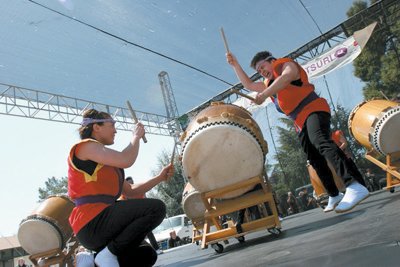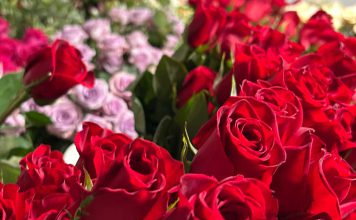This year’s Morgan Hill Haru Matsuri, or spring festival, will
be the 50th, and the local Japanese-American community will
celebrate with a two-day event starting with an all-day taiko drum
expo.
This year’s Morgan Hill Haru Matsuri, or spring festival, will be the 50th, and the local Japanese-American community will celebrate with a two-day event starting with an all-day taiko drum expo.
Haru Matsuri starts with the NorCal Taiko Expo, then concludes with the main Haru Matsuri event, complete with Japanese food and arts and crafts vendors, a white elephant sale, dance and singing performances, and displays of the historical influence Japanese-American people have had in Morgan Hill. Food booths at the festival will prepare popular Japanese cuisine such as chicken teriyaki, sushi and manju.
Haru Matsuri is the longest-running festival in Santa Clara County. Morgan Hill Buddhist Community Center spokesman Brian Shiroyama said the festival celebrates the determination and pride of the local Japanese-American community, many of whose parents and grandparents first arrived in Morgan Hill at the beginning of the 20th century.
“Cohesiveness of the Japanese-American community, the positive influence of Buddhist teachings, and extraordinary commitment to become respected members of the overall community have helped to preserve the longevity of Haru Matsuri,” Shiroyama said.
Morgan Hill’s first-generation Japanese community first settled here to farm, mainly growing prunes, apricots and cherries, Shiroyama said.
Despite facing discrimination, including from the U.S. government which did not allow Japanese immigrants to become citizens, the community was able to provide “American-style living for themselves and their children.”
Following the Japanese government’s bombing of the U.S. Naval base in Pearl Harbor in 1941, everyone of Japanese ancestry was forced into internment camps, and were not allowed to return to California until 1945.
“The first generation, if they came back they made a fresh start, but their spirits were broken. The second generation had to take responsibility for what their parents could not achieve,” Shiroyama said.
When they were allowed to return, more came back to Santa Clara County than other part of the state, where they continued to face discrimination from established white farmers, based on Shiroyama’s extensive local research. In Santa Clara County, however, the Driscoll fruit company recruited Japanese-American people to work on their farms, mainly in strawberry fields.
“It worked out – they had reliable workers,” he added. “Driscoll gave them a place to live and paid them, and allowed them to start their life over again.”
Many Japanese-Americans also started nursery businesses.
The Hanamoto family came to Morgan Hill because of Driscoll, and is still here. Riuji Hanamoto, 81, said they didn’t have any money when they were released from the internment camps, so they took up Driscoll’s offer for sharecropping jobs. In 1952, the family purchased property on Miramonte Avenue, where they grew strawberries, kiwis and persimmons over the years, and where Hanamoto lives with his wife of 60 years, Laura.
Hanamoto was instrumental in forming the Morgan Hill Buddhist Center and, and has helped organize Haru Matsuri since its first year when it was called the “Oriental food sale.” In 1959, the Japanese-American community held the first Haru Matsuri as a fundraiser to purchase a butsudan, a traditional Buddhist altar. It was held at the Friendly Inn on Hale Avenue.
The first-generation members of the community have since died, but this year’s Haru Matsuri will focus on the accomplishments of the second generation who were instrumental in keeping the festival going.
Downtown visitors and residents will no doubt be attracted by the “powerful, captivating and rhythmic” sound coming from the Community and Cultural Center April 17, Shiroyama said. The drummers are scheduled to perform for five hours, with a break in the middle for demonstrations of dance, martial arts, singing and a tea ceremony.
Aside from being a display of Japanese-American heritage in Morgan Hill, the Haru Matsuri also promotes the camaraderie among all the generations.
Morgan Hill resident Rosemary Kamei has been involved with Haru Matsuri for 27 years, and before that her father-in-law helped organize the event.
“As part of the Buddhist community, we all just sort of help each other out,” said Kamei, who serves on the board of directors for the Santa Clara Valley Water District.
***
What: A celebration of Japanese music, art and cuisine
When: Saturday, April 17 and Sunday, April 18. The 14th annual NorCal Taiko drum expo will take place Saturday from 12 to 5 p.m. Vendors and more demonstrations of Japanese heritage will take place Sunday from 11 a.m. to 5 p.m.
Where: The Morgan Hill Community and Cultural Center, 17000 Monterey Road April 17. The Morgan Hill Buddhist Community Center, 16450 Murphy Ave. April 18.
Cost: Both events are free















